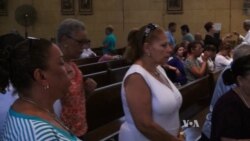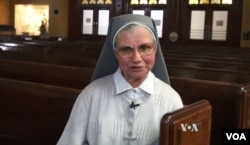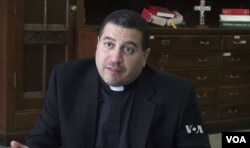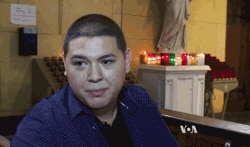Even on a weekday afternoon, the midday Spanish-language Mass at Saint Elizabeth church - located in New York city's Queens neighborhood - brings the faithful. More than half of all Hispanic Americans identify as Catholic. Many of this church’s parishioners are new immigrants from predominantly Catholic countries in Latin America.
According to a recent Pew Research Center study, nearly 90 percent of Hispanic Americans have a favorable opinion of Pope Francis, who will be visiting the city on September 25.
Sister Celia Cid says Pope Francis, who is the son of immigrants, understands their needs.
“He identifies with the struggles on many different nationalities, different countries and what they are going through," she remarked. "It’s a great hope for me to have him come because this city is a melting pot; it is a city built on immigrants.”
But nearly a quarter of Hispanic Americans are now former Catholics. Some leave for evangelical and Pentecostal churches, while others simply “drift away” from the Catholic church.
Father Ambiorix Rodriguez, an immigrant from the Dominican Republic, was raised in the Manhattan community where he now preaches. He says Pope Francis has a solution. The pontiff has advised his spiritual leaders to go out and connect beyond the confines of the church building.
“He is telling the church we can no longer stay inside, self-enclosed, worrying about who we have, who is here, but no, the church needs to go out," Rodriguez explained.
The departure of many Hispanics from the church is most pronounced among the young. Today, many under the age of 30 classify themselves as unaffiliated.
But the Pope’s openness invigorates young parishioner, Alias.
“If the Catholics who have drifted are based on ‘Oh, you don’t understand me,' or 'It’s too complicated,' or 'I’m tired of traditional habits,’ the pope is actually saying, ‘You know what, I am moving forward,' " Alias said, adding that the pope’s use of social media to connect with the next generation is one way he is keeping young people invested and interested.
"The youth are the future people of tomorrow. They are ones who are going to keep this church alive. And they are keeping the church alive. So that's where it starts to be honest, it's the youth," Alias said. "If the youth are not being influenced or moved by it, you’re going to lose a lot of members because it starts there."








